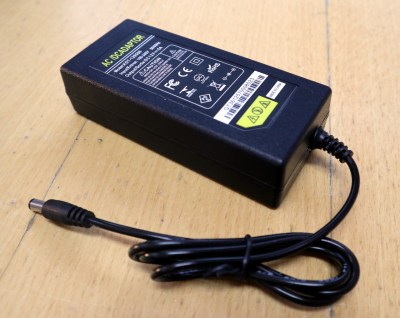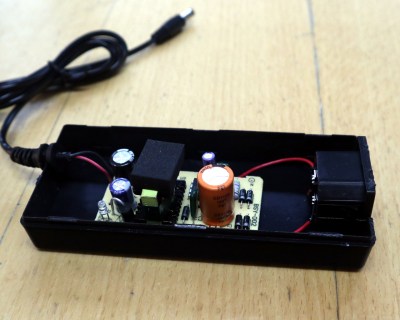

Junk I Bought: My PSU Just Won’t Do
source link: https://hackaday.com/2022/05/31/junk-i-bought-my-psu-just-wont-do/
Go to the source link to view the article. You can view the picture content, updated content and better typesetting reading experience. If the link is broken, please click the button below to view the snapshot at that time.

I have an Acer monitor that I’ve owned for around 15 years, and thanks to my having paid extra at the time for the model sporting a DVI socket for HDMI compatibility it still finds a place as one of my desktop monitors. It has a power brick that supplies it with 1 2V at 4.5 A, and over the years this has developed an annoying whine. Something’s loose in the magnetics, and I really should replace it. So off to AliExpress I went, and dropped in an order for a 12 V, 5 A power brick.
It’s No Heavyweight
So far so good…
These units are pretty standard, a box about 130 mm by 60 mm with an IEC socket at one end and a trailing cable at the other for the low voltage. I’ve had enough of them pass through my hands over the years to know what to expect, so I was dismayed to find when I received my PSU that it was suspiciously light. 86 g compared to the around 250 g I’d expect, so I began to smell a rat. Time for a teardown, and a descent into the world of small switch-mode mains power supplies.
Normally it should be easier to break into Fort Knox than to crack open a mains power supply, because for safety they are ultrasonic welded together. The few times I’ve done it have required some Dremel time and a bit of swearing, so when this case turned out to open fairly easily by levering with a screwdriver it was evident this wasn’t a high-quality item. Sure enough my suspicions were confirmed, for there inside was a much smaller board. It’s clear this isn’t a 5 A power supply, so just what have I received?
For A Fake, It Could Be Worse
… but not so good inside.
On the board were the components I’d expect for a small switch-mode mains PSU. Rectifier, electrolytic capacitor, control chip, opto-isolator, ferrite transformer. It’s a through-hole board, and unlike with some plug-top chargers the designer has given them plenty of space. Flipping it over and there’s a reasonably healthy 6.25 mm of physical isolation between the two sides, with an additional milled slot beneath the opto-isolator. I can’t comment on the quality of the transformer without prising it apart, but maybe it could be a little more chunky.
The board itself could even be reasonable, even if it’s in a flimsy box wired with dubious hair-thin conductors and secured only by a sticky tab. Zooming in on the chip I found a CSC7224, a little 18 W 8-pin DIP. It’s a generic chip that’s available from more than one Chinese manufacturer, and it implements a pretty straightforward switch-mode PSU. It seems to follow the circuit in the data sheet pretty closely except for the mains filter, meaning that it’s probably a working and not scarily unsafe 12 V supply module. If I needed one good for 1.5 A I’d be happy.
So I’ve been taken for a ride by a supplier on the other side of the world, and for your entertainment and edification I’ve turned it into a Hackaday article. Props to AliExpress for this, when I raised a dispute with photo and description of the hardware they did a no-questions refund. What can I take away from this, other than a warning not to play random PSU roulette again? The first thing is that, from the point of view of the manufacturer, it’s too cheap even to be a successful fake product. If I can tell by its weight that it’s fake the minute I pick it up then they’ve failed, so I’m curious as to why they didn’t make it a bit more convincing by putting a bit more weight in it. At least the chip has overcurrent protection built in, so it will simply refuse to serve 5 A rather than burst into flames.
Thus I’ve opened myself up for ridicule in the comments, and evidently I should have shelled out a little bit more. Have any of you ever been ambushed by a fake PSU?
Recommend
About Joyk
Aggregate valuable and interesting links.
Joyk means Joy of geeK

